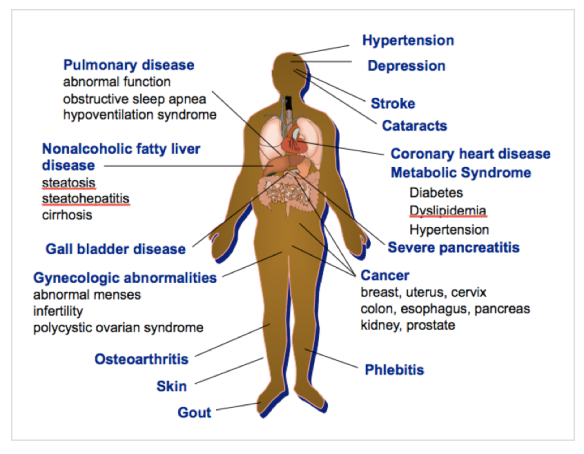I Hate Talking About Weight!
Honestly, I don’t really enjoy talking and thinking about weight, mine or anybody else’s. Who does?
It’s a bit ironic given the majority of my research is on diet and obesity. Many of my studies look at how what we eat and drink impacts weight gain and its risk to diseases such as type 2 diabetes and heart disease.
This article needs to be on my blog, however, since we live in a world with a pandemic obesity crisis. In the United States alone, approximately two-thirds of adults and one-third of kids are overweight or obese. (Many people who are overweight or obese do not recognize it; I encourage you to calculate your body mass index and discuss your weight with your physician if you are uncertain.) As Westernized lifestyles, behaviors, and food gets exported around the globe, so, too, do our obesity rates: According to the International Obesity Task Force, more than 1 billion adults and 200 million children worldwide are currently overweight while an additional 600 million adults and 40-50 million children are obese.
The reason I don’t enjoy talking about weight is because I actually began my research career thinking about how pervasive and destructive the Westernized perception of beauty is in the US (and some other countries, too). We are bombarded with images of women of unrealistic body sizes and shapes with virtually unattainable weights barring chronic food deprivation. It bothers me greatly that we have such a narrow perception of beauty here in the US, and the last thing I want is for my own research—or this blog!—to fuel this grotesque fire.
That’s why I subtitle many of the lectures I give on this topic “A Matter of Health,” just as I’ve named this blog piece. Because my wish is not that overweight individuals hate their body: the current stigma of fat shaming and weight bias is obscene. Yet, the simple medical fact is that excess body fat carries health risks that are essentially avoidable. Still today, it seems many people do not fully recognize the degree to which extra weight impacts their health. For example, type 2 diabetes is essentially a preventable disease for most people and in some cases can be reversed with weight loss. Many cancers have also been associated with obesity. Yet obesity impacts almost all body organs and systems.

(Source: The Obesity Society)
And note that the graphic does not adequately capture the psychological pain and suffering that many overweight individuals face due to diminished self-esteem and prejudice in our body-conscious culture. Especially troubling is the social difficulties and bullying some adults and children face due to weight discrimination.
Environment Matters: Individual Food Choices in Context
In my worldview, which is rooted in public health, an individual does not bear complete personal responsibility for his or her health, weight included. We are a product of genetics and our environment, not just our lifestyle. Most of us live in a society that encourages food consumption at every turn, in every place—and much of it unhealthy, I hasten to add. Food cost and accessibility are additional barriers to eating healthfully for some people as well. Individuals are thus part of a larger system that includes family, community, local, state, national, and global factors that impact our health and weight. (This is known as the social-ecological model of public health, in case you were wondering.) Food policies and production practices also influence what reaches individual plates, and these factors must be considered when working to stem the obesity epidemic on a population basis and help individuals manage their own weight at a personal level. (These topics are the subjects of many of my classes and research projects.)
Even so, when all is said and done the decision of what you choose to put in your mouth must ultimately be made by you. My mission is to help you apply the science to your plate delectably, and that includes cooking and eating in a way that promotes healthy weight. And guess what? Those same meals and habits that will keep you free from excess weight are the same ones that will keep you enjoying good health and living longer, too.
For the Record: My Own Weight
My regular readers know that I’m not just your average nutrition scientist given my life-long love affair with food. And a love of food isn’t always conductive to a healthy waistline.
As a teenager I put on more pounds than was healthy for my size. Like all daughters, I blame my mother. (Just kidding. Kind of.) In other words, the culture of sweets and constant desserts around our house when I was growing up certainly didn’t help matters. But I also began working in restaurants when I was fifteen, and every Saturday night in high school I worked from 5pm to 3am, sometimes 4am. Let’s just say snacking on burgers and fries and fried mozzarella weren’t the best choices. I continued working in restaurants for a decade, so was always surrounded by scrumptious food. Sure, I eventually took off that extra adolescent weight, but I, like many of you, gain weight just by looking at chocolate cake. I practice the strategies I preach to you—like keeping your house free of snacks and sweets and practicing healthy holiday eating tips—because they are based on science, and they work. I’ve altered my behavior and lifestyle and my weight has followed suit.
Reprinted with permission from Dr. P.K. Newby. Originally printed on pknewby.com
P.K. Newby, ScD, MPH, MS (“The Nutrition Doctor”), is a scientist, author, and adjunct associate professor at Harvard whose newest book is “Food & Nutrition: What Everyone Needs to Know.”

